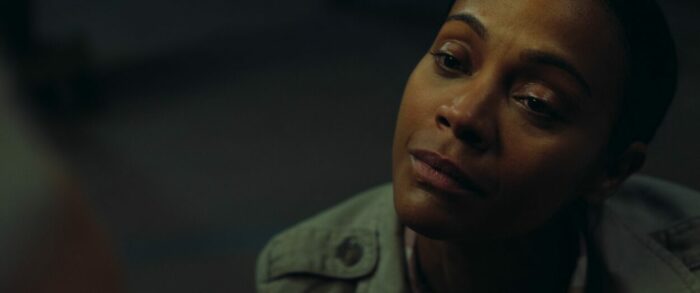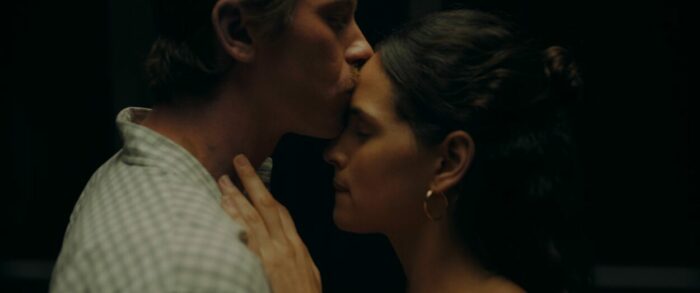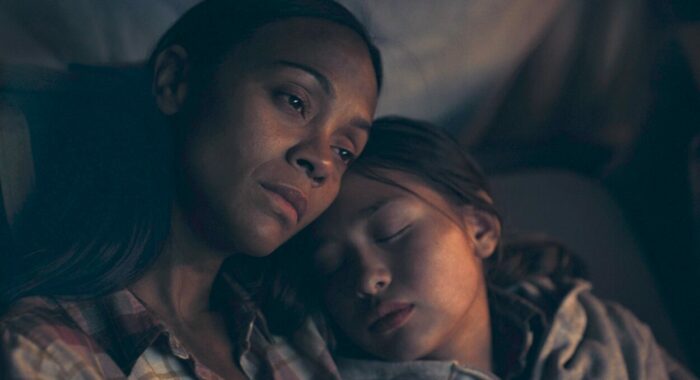When it comes to the contentious social and political conflicts surrounding the immigration issues between Mexico and the United States of America, it’s very easy to create “us vs. them” measurements and scenarios. On many occasions, each side has called out opposing irregularities and hostilities to declare themselves in the right while labeling the other the enemy. The Absence of Eden, the debut directorial effort from Marco Perego, attempts to address this balance while carrying a burdensome “us vs. them” dual narrative.
South of the border, multi-blockbuster star Zoe Saldana headlines as Esmerelda, an exotic dancer living with her grandmother. One night, a demanding customer tries to force more action from Esmee at gunpoint. She is able to turn the tables and shoot the man dead. The perpetrator was an active crime member with friends, putting Esmerelda on the run, self-defense claim be damned. She takes what cash she has squirreled away, leaves her grandmother behind, and enlists a “coyote” to smuggle her into the United States.

From that catalyst event, much of The Absence of Eden follows the perilous and inhumane steps of the trafficking process of illegal immigration. People are sometimes bought and sold with no oversight, and children are tragically separated from their parents. Esmee tries in vain to protect a fellow traveler– a single mother and her daughter—only to find herself taking on the abandoned pre-teen when they are used as leverage for her compliance. She may be a fiercely independent person, but she is constantly at the mercy of the urges and armaments of the men in control.
When given the chance to lash out and be hard, Esmeralda scorns this clandestine system and its treatment of hopeful people. Her worth shouldn’t be a fee or price tag. Esmeralda enters the American workforce at the ugliest of entry level (in this case, as a drug mule motel maid), knowing full well she and many others fill the undesirable jobs no one wants. She knows the influx of immigrants helps the country grow and their presence should be enough. Yet, she’s encountering trap after trap of people continuously taking more and more from her and her brethren.

On the other side of The Absence of Eden’s coin is newly deputized Immigrations and Customs Enforcement agent Shipp, played by The Tutor‘s Garrett Hedlund. More often than not, he is sternly quiet, ignores his ailing father’s phone calls, but can hold his own in a skirmish. However, Shipp is decidedly not as brash and gung-ho as his hothead veteran partner Dobbins (Chris Coy of TV’s The Deuce), making him a minor liability working next to a large one. Showing that softer side, Shipp becomes smitten with the single mother Yadira (Adria Arjona of Morbius), a local woman living with extended family. His path to learn the ropes of this agency is a tangential story which takes place away from Esmee’s plotline and garners equal share of the running time.
Like Esmerelda’s portion of The Absence of Eden, Shipp is given a bit of a platform to stump on as well. By crafting him less volatile than the other ICE agents and providing the character with a love interest, an angle of sympathy is attempted by Perego and his writing partner Rick Rapoza (Cactuses) towards the one good egg of law enforcement shown in the movie embroiled in the tenuous border situation. For the better part of two decades, Garrett Hedlund has made a long career playing ponderous damaged goods types in a number of mainstream and indie roles. He can provide soulful support, but full-blast gallantry is outside his wheelhouse.

Speaking of soulfulness, Marco Perego, the husband of Saldana, brings a stylish eye to his first feature. He partnered with cinematographer Javier Julia (Wild Tales, To Catch a Killer) to compose excellent lighting work, shadow play, and stellar outdoor location shooting. Perego will even get a little Malick-ian on occasion. For example, Julia’s shooting often lingers in its gaze a few extra beats on completed shots and scenes, like the slow first approach and reveal of Arjona’s beautiful Yadira or the use of coyotes as imagery of fear. In addition, his opening scene frames a flamingo statue engulfed in a house fire before the view shifts to outer space imagery gradually morphing into the caramel iris and pupil of his wife’s eye. Other than the eye of our lead, none of that is useful in the grand scheme of The Absence of Eden, but it sure looks pretty and evocative when merged with the low dirge score of Oliver Coates (Aftersun).
Within The Absence of Eden’s naturalistic palette lies the two competing storylines of people trying to avoid problematic trouble and the pressured pulls of their more evil superiors. Between the harrowing tale of a fugitive trying to make it to the safety of The Land of Opportunity or the internal study of a downtrodden man deputized to defend that nation, The Absence of Eden has two strong skeletons of potential and consequence. Both sides finger point external problems and threats. Unfortunately, the trajectories of Esmee and Shipp do not converge until the final twenty minutes of a movie just over 90 minutes, when his antenna for illegal activity zeroes in on her motel.
Even granting The Absence of Eden reflective patience to flesh out a multi-pronged saga, that final intersection of the two leads occurs too late, is insufficiently brief, and not impactful enough to satisfy or resolve the double narrative. This is a rare movie that should have been longer to craft more ties amid its anchors. Better yet, it probably could have been developed into two separate movies entirely. There’s also the care level. Esmee’s story is far more compelling than Shipp’s and the more important one to showcase. Give the movie to Zoe Saldana and leave the bro culture law enforcement interpolation to be its own separate task to correct and humanize somewhere else.




